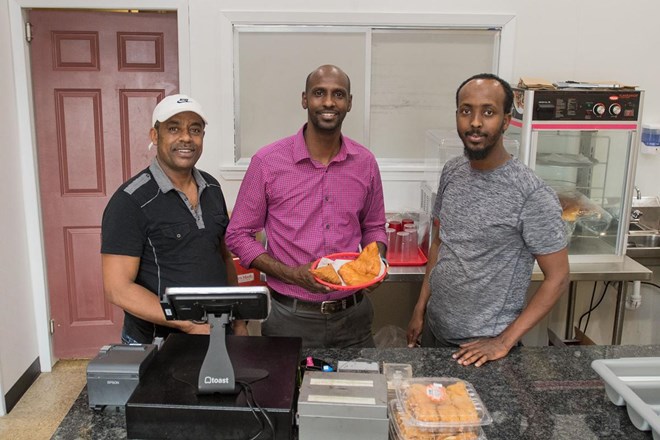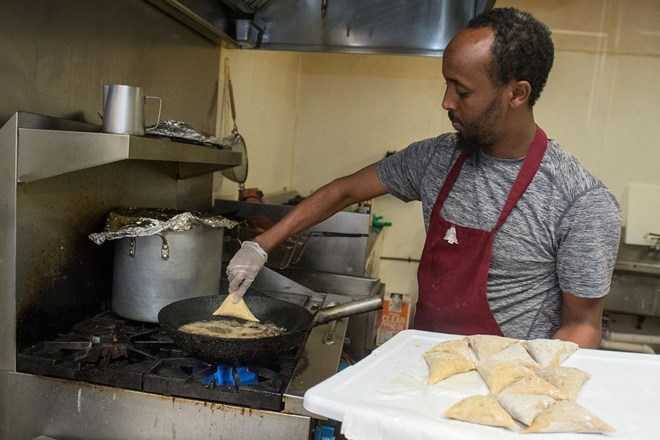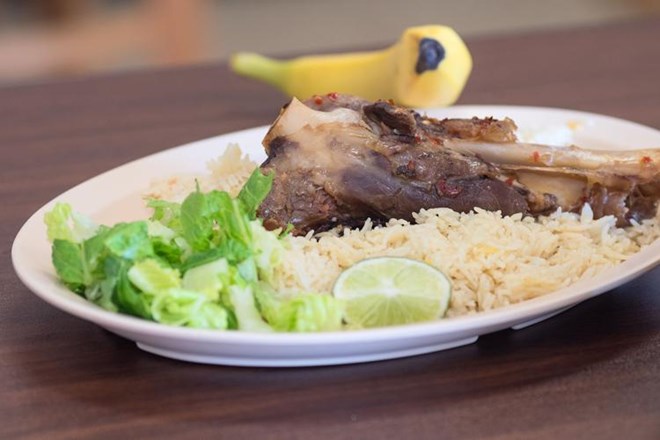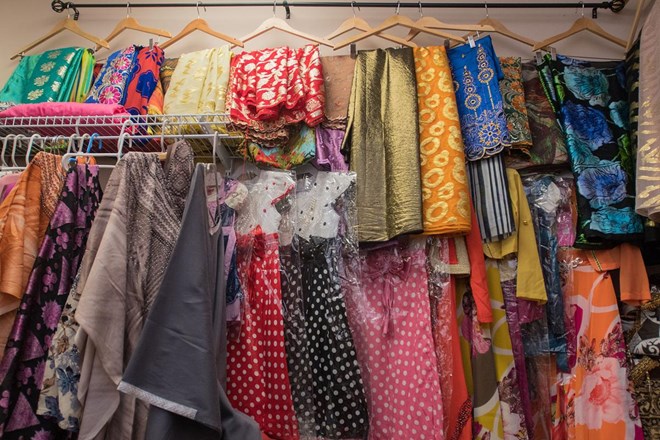
By Dan Greenwood Staff Writer
Sunday June 10, 2018
MANKATO — When Mohamed Ahmed first came to Mankato in 2001, he had no idea he would own the very store he first worked at as a teenager. It goes by many names and has changed hands four times, but Brothers Restaurant and Grocery has been a staple for the city’s growing Somali-American community and Minnesota State University’s international students.
That store, at 2156 Hoffman Road, was the first place in Mankato where you could buy halal meat, which is slaughtered according to Islamic tradition. Ahmed’s family lived just a block away. So when it opened in 2002, he starting working there.
“I used to do cleaning, filing the shelves, cutting meat and getting items for customers,” Ahmed said.
It’s now one of five halal markets in town, providing Somali comfort food, halal meat and hard to find spices and products from all over the world to a loyal and expanding customer base.
Ahmed, who has a business degree from MSU, is a tax accountant who also owns a personal care assistant agency. With a family and two businesses, Ahmed already had a lot on his plate. But he jumped at the opportunity to buy the store in 2015 when the previous owner was selling.
“I knew the potential this place has, the locality — the historical connection to the community,” Ahmed said. “It’s the only place that not only has a grocery but a restaurant. I thought this is a good place to do business.”
“We have people who are going to work or who want to take their iftar (meal eaten by Muslims after sunset), to break their fasting,” Ahmed said. “We have a big gathering here. The goat and the lamb are the two most popular plates.”
Goat meat and rice is a traditional Somali meal, but the restaurant and store also has chicken, beef and fish. If you want camel meat, you can head downtown to Barkhadle International Grocery, at 725 S. Front St. Customer Fatuma Hassan says a meal of Somali rice and seasoned camel reminds her of her roots.
“It tastes just like steak,” Fatuma said.
She and her family moved to Mankato from Fargo, North Dakota, over a decade ago. When they first arrived, they had friends in town who recommended Barkhadle International Grocery as a convenient location within walking distance of their home. The paraprofessional with the Mankato school district appreciates there are now several options for halal meat in town.
“We as Muslims only eat halal food,” Hassan said. That means that a prayer is said before the animal is slaughtered using a sharp knife to slit the throat. The intention is to honor the animal and minimize suffering. Because Muslims avoid pork, stores like Brothers and Barkhadle also provide gelatin-free options for anything from candies and marshmallows to frosting and Jell-O.
Barkhadle International Grocery was the second halal market to open in town. It’s named after Ahmed Barkhadle, who opened the store in 2004. Like Mohamed Ahmed, Barkhadle and his family moved here when the Somali diaspora in Mankato was made up of just a few families.
“I was working in the Middle East and got a green card,” Barkhadle said. “My friend was living here. I was an X-ray technician back home. When I came here, I had to start over.”
As he thought about what to do for money, he saw a growing need for halal meat and other products from East Africa. Then he saw a “for rent” sign at a storefront on Front Street and called the number to make an offer.
“The owner said ‘OK, but I can’t give you the whole year. I want to see how it’s working. I don’t want to lose money,’" Barkhadle said. “He gave me three months only.”
It was a gamble that would prove to be worth it. Business is stable and nowadays he renews his lease every five years.
Barkhadle says the international students at MSU make up 50 percent of his customer base. He’s expanded his inventory to cater to students from South Asia; you can now get coconut milk and nine different kinds of fish. He’s also seen an uptick in customers from other parts of the African continent.
“Most of the students that come in here are from West Africa. I am from East Africa,” Barkhadle said. “It’s a different language, different ideas and different food. I try my best to bring in what they like, but because it’s not my culture, sometimes I don’t have it and ask them to write it down. Then I’ll bring (order) it.”
Both Barkhadle and Mohamed Ahmed at Brothers Grocery and Restaurant say business picks up especially on weekends. It helps that the Twin Cities is such a cosmopolitan hub for wholesalers. They are able to adjust what they carry based on the university’s ever-changing global demographic. In Mankato, most long-term Muslim residents are from Somalia. But Mankato being a college town adds to that diversity, where Muslim students from Asia have similar dietary restrictions and are willing to try new foods they may not be accustomed to.
“You have a lot of international students from the Middle East, Asia, Pakistan and India,” Ahmed said. “Because what we make here is halal food, a lot of students prefer coming here rather than going somewhere else.”
As Mankato’s population grows, so do its halal markets. The longevity of Brother’s Restaurant and Grocery and Barkhadle International Grocery attest to that rising demand. Since then three more have opened around town. Last year International Grocery and Halal Inc. on Riverfront Drive became the fifth halal market to open in Mankato.



